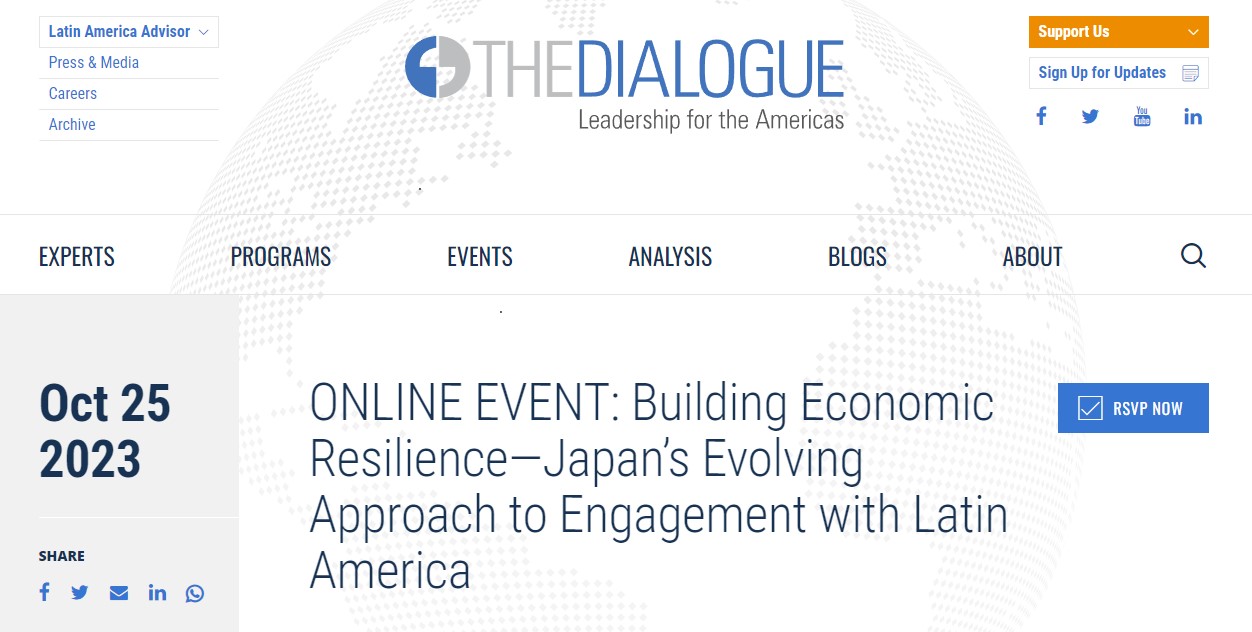Building Economic Resilience—Japan’s Evolving Approach to Engagement with Latin America
Work area(s)
Teaser
How is Japanese engagement with the region evolving to accommodate shifting global and regional conditions? What are the possibilities for enhanced Japan-Latin America cooperation on issues of shared concern, including food security, economic resilience, and the integrity of democratic institutions? In what sectors and countries has Japan’s involvement been most supportive of Latin America’s economic and political objectives to date, and can these examples be replicated in other parts of the region?
Event information

Raquel Artecona, Economic Affairs Officer of the ECLAC office in Washington D.C, participated as a panelist in this event.
Latin America’s importance within the global economic and political architecture has grown immensely amid ongoing geopolitical turbulence, including Russia’s invasion of Ukraine, and other threats to global supply chains. The region has historically played a critical role as a provider of food and wide-ranging other raw materials for much of the globe. Now, the prevalence of critical minerals has positioned the region as an essential node in industrial supply chains.
For decades, Japan has crafted partnerships in Latin America that are at least partially predicated on its abundant resources. But Japan’s interests in Latin America are increasingly broad-based, especially since the introduction of late Prime Minister Shinzo Abe’s transformative foreign policy “Juntos!” Japanese companies and government agencies are pursuing opportunities in a wider range of economic sectors, and in support of some of the region’s most pressing development objectives. The principles advanced in the recent G7 Hiroshima Summit—including on food security, achieving secure and resilient industrial supply chains, and safeguarding democratic values—also feature prominently in Japan’s current approach to Latin America and much of the rest of the Global South.
How is Japanese engagement with the region evolving to accommodate shifting global and regional conditions? What are the possibilities for enhanced Japan-Latin America cooperation on issues of shared concern, including food security, economic resilience, and the integrity of democratic institutions? In what sectors and countries has Japan’s involvement been most supportive of Latin America’s economic and political objectives to date, and can these examples be replicated in other parts of the region?
Our distinguished panelists will consider these and other questions during this ninth in a series of public meetings co-organized by the Japan Association of Latin America and the Caribbean (JALAC) and the Inter-American Dialogue, held on October 25, 2023 from 9:00 to 10:30 AM EDT.
Schedule
OPENING REMARKS
NOBUAKI HAMAGUCHI
Vice President, Japan Association of Latin America and the Caribbean; Professor, Kobe University
COMMENTARY
YASUSHI NOGUCHI
Director General, Latin America and the Caribbean Affairs Bureau, Japan Ministry of Foreign Affairs
OLIVER STUENKEL
Associate Professor, Fundação Getulio Vargas (@OliverStuenkel)
RAQUEL ARTECONA
Economic Affairs Officer, Washington Office, United Nations Economic Commission for Latin America and the Caribbean
HIDENORI MURAKAMI
Former Vice Minister for International Affairs, Japan Ministry of Agriculture, Forestry and Fisheries, and former Japanese Ambassador to Chile
MAKOTO HIRATA
Deputy Director, Central and the Caribbean Division, Latin America and the Caribbean Department, Japan International Cooperation Agency
CLOSING REMARKS
MICHAEL SHIFTER
Senior Fellow, Inter-American Dialogue (@MichaelShifter)
MODERATOR
MARGARET MYERS
Director, Asia and Latin America Program, Inter-American Dialogue (@MyersMargaret)